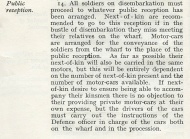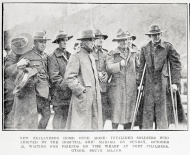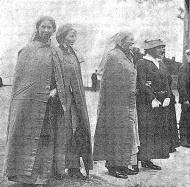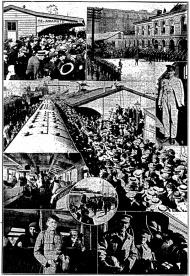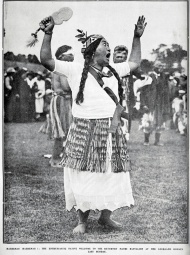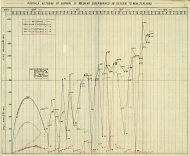Events In History
-
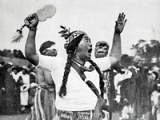 6 April 1919NZ (Māori) Pioneer Battalion returns from war
6 April 1919NZ (Māori) Pioneer Battalion returns from warThe Pioneer Battalion was one of only two NZEF formations to return from the First World War as a complete unit. Its welcome home was more extensive than that given to other troops. Read more...
-
 30 October 1918Massive prohibition petition presented to Parliament
30 October 1918Massive prohibition petition presented to ParliamentA petition with more than 240,000 signatures demanding an end to the manufacture and sale of alcohol in New Zealand was presented to Parliament. Read more...
-
 7 October 1917German 'Sea Devil' imprisoned in NZ
7 October 1917German 'Sea Devil' imprisoned in NZCount von Luckner's raider Seeadler sank 14 Allied ships in 1917 before he was captured in Fiji. His subsequent escape from Motuihe Island in the Hauraki Gulf made him a legend. Read more...
-
 22 December 1916Future PM Fraser charged with sedition
22 December 1916Future PM Fraser charged with seditionPeter Fraser's trial at the Wellington Magistrates' Court was the sequel to an anti-conscription speech. A number of union leaders were charged with the same crime. Fraser was convicted and served 12 months in gaol. Read more...
-
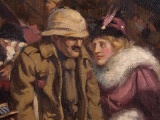 15 July 1915Gallipoli wounded arrive home on the Willochra
15 July 1915Gallipoli wounded arrive home on the WillochraThe first large group of men wounded at Gallipoli to return to New Zealand arrived in Wellington on the Willochra in mid-July 1915 as part of a draft of around 300 men Read more...
-
 16 October 1914Main Body of NZEF sails to war
16 October 1914Main Body of NZEF sails to warThousands of Wellingtonians rose before dawn and crowded vantage points around the harbour to watch as 10 grey-painted troopships, escorted by four warships, sailed to war. Read more...
Articles
First World War - overview

Archduke Franz Ferdinand, heir to the throne of the Austro-Hungarian Empire, and his wife Sophie were assassinated in the Bosnian city of Sarajevo. This was a key event in sparking the Great War of 1914–18.
-
Page 5 – The war at home
New Zealand played a small but useful part in the British Empire's war effort, and its essential war aim was achieved with the defeat of Germany and its allies in late 1918.
Supporting the war effort

Thousands of New Zealanders donated money, goods or time to help those affected by the First World War.
-
Page 2 – Overview: 1914-1919
The sacrifices of the men at the front, and the plight of those living in the war zones, drove many New Zealanders to donate money, goods and time to help the war effort. By
-
Page 3 – Who were the volunteers?
The outbreak of war saw New Zealanders from all walks of life donate money, goods and time to fundraising efforts.
-
Page 4 – What were the causes?
War relief and aid societies directed their efforts at a wide variety of causes.
-
Page 5 – Supporting Belgium: Queen Elisabeth Medal
The Belgian government created the Medaille de la Reine Elisabeth, or Queen Elisabeth Medal, to honour Belgian and foreign women who had performed outstanding services in aid
-
Page 6 – Further information
Books and website links relating to war relief and aid work in New Zealand during the First World War, 1914-1919.
Schools and the First World War

Schools and children were quickly called into action at the outset of the First World War in 1914. Developing patriotic, fit and healthy citizens was seen as important to the survival of the country and the Empire. Hundreds of teachers joined the NZEF, including many from sole-teacher schools. Almost 200 never returned.
-
Page 4 – The School Journal
During the First World War the New Zealand School Journal played an important role in encouraging patriotism, self-sacrifice, obedience and support for the war effort among
-
Page 6 – Supporting the war effort
During the war children were encouraged to be ‘cheerful’ and ‘helpful’, to ease the worry and sorrow of the mothers and wives of soldiers. There were also many practical ways
-
Page 7 – Teachers who served
Whether as school cadet officers or supporters of saluting the flag, teachers did much to set the moral tone of New Zealand schools before and during the war. Many hundreds
The Post and Telegraph Department at war

The Post and Telegraph Department (the government agency from which New Zealand Post, Telecom and Kiwibank are descended) was crucial to this country’s participation in the First World War.
-
Page 3 – The Post and Telegraph Department in 1914
In the early 20th century, the Post and Telegraph Department's reach extended throughout the Dominion, and it was to stretch even further after war broke out in August 1914.
First World War farewells

Between 1914 and 1918, New Zealanders farewelled more than 100,000 men as they headed off to a military training camp or went straight to war.
- Page 1 - First World War farewellsBetween 1914 and 1918, New Zealanders farewelled more than 100,000 men as they headed off to a military training camp or went straight to war.
First World War laws and regulations

An annotated index of New Zealand wartime laws and regulations 1914-21
- Page 1 - Index of wartime laws and regulations, 1914-21An annotated index of New Zealand wartime laws and regulations
First World War by the numbers

This article provides a clearly written and carefully argued statistical survey of New Zealand’s military contribution to the First World War.
- Page 1 - First World War by the numbersThis article provides a clearly written and carefully argued statistical survey of New Zealand’s military contribution to the First World War.
The Public Service at war - overview

The New Zealand public service played a central part in New Zealand’s war effort, both at home and abroad
- Page 1 - The Public Service at war - overviewThe New Zealand public service played a central part in New Zealand’s war effort, both at home and
NZ Railways at war

The railway system and its workforce was one of the most valuable assets available to the New Zealand state to support the national effort during the First World War
-
Page 3 – NZ Railways in 1914
On the other side of the world, New Zealand’s rail network was a small link in the vast wartime supply chain
-
Page 5 – Manpower challenges at home
How did New Zealand Railways (NZR) keep up its massive manpower commitments during the First World War, while still maintaining services to its customers?
-
Page 6 – Railways war memorials
Railway workers honoured the service and sacrifice of their colleagues in numerous ways.
First World War homecomings

New Zealand troops began returning from overseas in small numbers in late 1914. The first arrivals, from Samoa, were followed by many more from Egypt and Turkey, and later from England and France.
- Page 1 - First World War homecomingsNew Zealand troops began returning from overseas in small numbers in late 1914. The first arrivals, from Samoa, were followed by many more from Egypt and Turkey, and later from
The public service in 1914

In 1914 the public service employed 33,000 permanent employees, including railway workers, post and telegraph staff, teachers, and police, plus 16,000 temporary employees, mainly in public works and railways.
- Page 1 - The public service in 1914In 1914 the public service employed 33,000 permanent employees, including railway workers, post and telegraph staff, teachers, and police, plus 16,000 temporary employees, mainly
Getting the men to war

The public service was the engine of New Zealand’s military war effort between 1914 and 1918. It took charge of signing up – and later conscripting – men for service abroad, training them, clothing them, housing them and transporting them to the northern hemisphere, where they became the responsibility of the British military.
- Page 1 - Getting the men to warThe public service was the engine of New Zealand’s military war effort between 1914 and 1918. It took charge of signing up – and later conscripting – men for service abroad,
Maintaining public services during the war

The government immediately reset its priorities on the outbreak of war in August 1914. Everything else was subordinated to winning the war.
- Page 1 - Maintaining public servicesThe government immediately reset its priorities on the outbreak of war in August 1914. Everything else was subordinated to winning the war.
Feeding Britain

From March 1915 the British government purchased New Zealand’s entire output of frozen meat to help ensure a regular flow of food to the British public and the British Expeditionary Force in France and Belgium.
- Page 1 - Feeding BritainFrom March 1915 the British government purchased New Zealand’s entire output of frozen meat to help ensure a regular flow of food to the British public and the British
Policing the war effort

In 1914 the New Zealand government moved quickly to strengthen the rule of law and keep the country focused on winning the war
- Page 1 - Policing the war effortIn 1914 the New Zealand government moved quickly to strengthen the rule of law and keep the country focused on winning the
Repatriation of returned servicemen

Reintegrating tens of thousands of men into the civilian population at the end of the war presented a new set of problems
- Page 1 - Repatriation of returned servicemenReintegrating tens of thousands of men into the civilian population at the end of the war presented a new set of
Honouring public servants

The public service as a whole, government departments and individual public servants found a myriad of ways to honour their employees’ and colleagues’ war service.
- Page 1 - Honouring public servantsThe public service as a whole, government departments and individual public servants found a myriad of ways to honour their employees’ and colleagues’ war
New Zealanders who resisted the First World War

Lists of men who for a variety of reasons refused to serve in the First World War.
-
Page 3 – Convictions for sedition 1915-18
The War Regulations Act 1914 allowed citizens to be arrested and charged with sedition for making ‘disloyal’ or ‘seditious’ statements, either verbally or in print. This page
Merchant marine

On 3 September New Zealand honours Merchant Navy Day. Here we explore the little-known but vital role played by the merchant marine during the First World War, when these civilian seafarers often found themselves in the front line of the war at sea.
- Page 7 - Home watersThe First World War had a dramatic impact on shipping to and from New
Rolls of honour and obituaries

Government rolls of honour and obituaries published at the end of the First World War.
- Page 7 - Post and Telegraph obituaries
Biographies
-
 Robin, Alfred William
Robin, Alfred William
As General Officer Commanding the troops based in New Zealand, Alfred Robin was the person with the most direct overall responsibility for New Zealand’s military war effort other than the Minister of Defence
Read more... -
 Triggs, Robert
Triggs, Robert
Robert Triggs served as Assistant Public Service Commissioner and Public Trustee during the First World War
Read more... -
 Mulcahy
Mulcahy
Mary Mulcahy was one of the many women who worked on the conscription ballot for Government Statistician Malcolm Fraser in the second half of the war
Read more...
Related keywords
- conscientious objection
- conscription
- WW1 stories
- joseph ward
- hms new zealand
- religion
- cartoon
- public service
- rotorua
- roll of honour
- training camps
- featherston
- levin
- robert triggs
- mary mulcahy
- advertising
- taihape
- alfred robin
- christchurch
- auckland city
- prison
- stratford
- wellington city
- peace celebrations
- postal service
- meat
- export
- crime
- napier
- armistice
- whanganui city
- trentham
- panorama
- education
- police
- railways
- wellington harbour
- gallipoli campaign
- battle of the somme
- horses
- fundraising
- canterbury
- petone
- poster
- reform party
- william massey
- recruitment
- law
- architecture
- rimutaka
- alcohol
- telegraph
- protest
- maungaturoto
- letters
- postcard
- peter fraser
- prostitution
- genealogy
- pioneer battalion
- shipping
- communications
- government
- rua kenana
- maungapohatu
- painting
- hms philomel
- royal navy
- nelson city
- willochra
- music
- WW1
- nurses
- belgium
- john grant
- victoria cross
- hawera
- german samoa occupation
- hospital ships
- port chalmers
- james allen
- lord liverpool
- economy
- masterton
- railway stations
- maheno (hospital ship)
- war brides
- prohibition
- photography
- prisoners of war
- basin reserve
- red cross
- lady liverpool
- miramar
- cambridge
- medals
- women
- te puke
- dunedin
- salvation army
- war art
- walter bowring
- maori in war
- gisborne
- tunnelling
- influenza pandemic
- trade unions
- memorials
- governor
- health
- wakefield
- native contingent
- miria pomare
- maui pomare
- nelson
- radio broadcasts
- children
- primary schools
- sheep
- george hogben
- school journal
- knitting
- teaching
- wellington college
- merchant marine
- international trade
- drink
- german navy
- statistics
- lyttelton
- film
- trains
- gore
- YMCA
- british empire
- casualties
- death
- western front
- passchendaele offensive
- anzac day
- war memorials
- clothing
- anzac
- national identity
- ormond burtonn
-
Main image: Duncan McCormack, conscientious objector
Scotsman Duncan McCormack was one of the 286 conscientious objectors imprisoned for refusing military service during the First World War.





























































































































